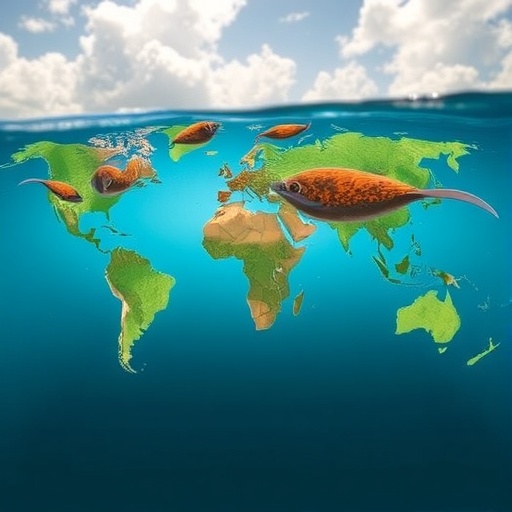In a groundbreaking study recently published in Nature Water, researchers led by Eric Capo, Assistant Professor at the Department of Ecology, Environment and Geoscience at Umeå University, have revealed a chilling glimpse into the Earth’s past that casts new light on the future of marine ecosystems under climate change. Their research uncovers how historic oxygen loss events in the Black Sea, dating back thousands of years, triggered a surge in the abundance of microorganisms capable of producing methylmercury, one of the most potent neurotoxins known to science. The implication is clear and urgent: as global warming progresses and marine deoxygenation intensifies, we may be on the brink of a similar biogeochemical threat in modern oceans.
Methylmercury is infamous for its extreme toxicity and its ability to bioaccumulate in marine food webs, reaching concentrations in fish and seafood that pose significant health risks to humans and wildlife alike. This neurotoxin forms primarily when specialized microbes transform inorganic mercury—a naturally occurring element—into its organic, highly toxic counterpart under conditions of low or depleted oxygen. The discovery that climate-driven oxygen decline alone can ignite such processes, even in the absence of industrial pollution, challenges conventional thinking about mercury contamination pathways and amplifies concerns over the ecological and public health consequences of expanding hypoxic zones.
Today’s oceans are witnessing a troubling trend where warmer waters and stratification reduce oxygen solubility and vertical mixing, while nutrient runoff fosters eutrophication and algal blooms. These factors culminate in expanding oxygen minimum zones and dead zones, notably in enclosed or semi-enclosed seas such as the Baltic Sea. These environments mimic the conditions that prevailed in the Black Sea during the mid-Holocene era, around 9,000 to 5,500 years ago, when global and regional climate patterns fostered warm, humid conditions that drastically reduced oxygen levels in deep waters.
The researchers conducted meticulous analyses of sediment cores extracted from the Black Sea, spanning the last 13,500 years, employing advanced molecular techniques to detect genetic markers associated with mercury-methylating microbes. The gene hgcA, key for mercury methylation, served as a biological fingerprint revealing the historical abundance and activity of these microorganisms. Remarkably, the highest concentrations of hgcA coincided with periods of pronounced deoxygenation, underscoring a direct link between reduced oxygen levels and microbial mercury methylation.
Eric Capo emphasizes the significance of these findings: “Our data demonstrate that diminishing oxygen in marine environments, driven by natural climatic shifts, created hotspots where methylmercury production flourished. This raises alarms regarding present-day climate change, as similar oxygen-depleted conditions are increasingly common and are likely to exacerbate methylmercury contamination without the presence of new mercury sources.” This insight reshapes how scientists understand the interplay between climate systems and biogeochemical cycles of mercury.
Further reinforcing the relevance of historic trends to the present, the team compared ancient microbial signals with those detected in contemporary Black Sea waters. While modern mercury methylation is heavily influenced by industrial mercury emissions and nutrient pollution, the ancient microbial populations flourished primarily due to climate-induced hypoxia and organic matter accumulation. This contrast highlights the multifaceted drivers shaping mercury dynamics across temporal scales and signals that even absent anthropogenic mercury inputs, climate-driven oxygen scarcity alone can enhance neurotoxin production.
Given the complex global implications, this research portends vast ecological and societal risks. As oxygen-deficient marine zones expand under climate change, the proliferation of methylmercury-producing microbes could lead to heightened neurotoxin exposure for marine organisms, jeopardizing fisheries, and consequently human food security and health. Such exposures are linked to severe neurological impairments, particularly in early development stages, signaling a pressing need for integrated monitoring and mitigation strategies that consider climatic and microbial factors.
The study also opens new avenues for paleoclimate and environmental microbiology research, showcasing how ancient sedimentary DNA can unravel long-term ecological responses to environmental stressors. By bridging the geological record with contemporary observations, the researchers crafted a nuanced narrative about the resilience and vulnerability of marine microbial communities under shifting environmental regimes.
Moreover, the findings underscore the importance of interdisciplinary approaches in environmental science, integrating genomics, oceanography, climatology, and toxicology to unravel the subtle yet profound ways in which global change can reconfigure elemental cycles and public health risks. As methylmercury persists as a global contaminant, understanding its natural and anthropogenic drivers is paramount for crafting informed policies and protecting marine ecosystems.
In summary, the study led by Capo and colleagues provides compelling evidence that climate-driven oxygen depletion events in the Black Sea’s deep waters thousands of years ago instigated robust microbial methylmercury production. This ancient biological fingerprint serves as a cautionary tale for today’s ocean ecosystems, where warming-induced hypoxia threatens to revive and amplify similar neurotoxic risks amid ongoing environmental change. Addressing this challenge demands global collaboration and innovative research, blending past insights with forward-looking strategies to safeguard ocean health and human wellbeing in a warming world.
Subject of Research: Climate-driven oxygen loss and its role in microbial mercury methylation in marine ecosystems.
Article Title: Climate-driven oxygen loss in the Black Sea thousands of years ago triggered methylmercury-producing microorganisms.
News Publication Date: 8 October 2025
Image Credits: Mattias Pettersson
Keywords: Marine ecology, Aquatic ecosystems, Climate change effects, Microbiology




